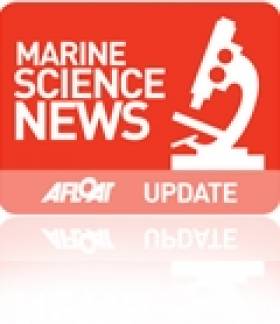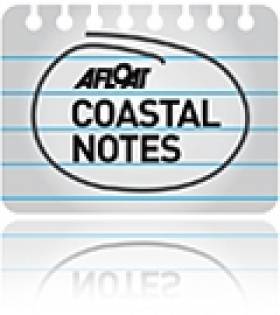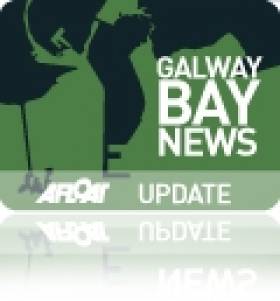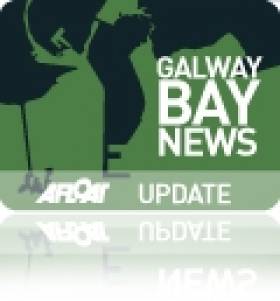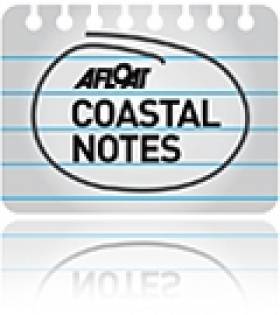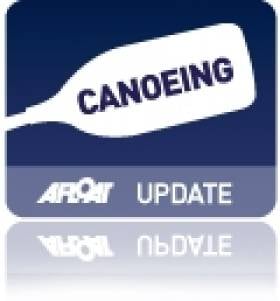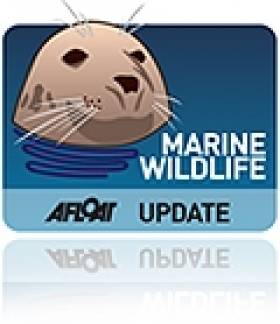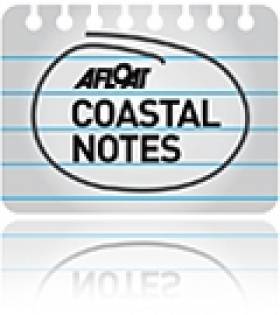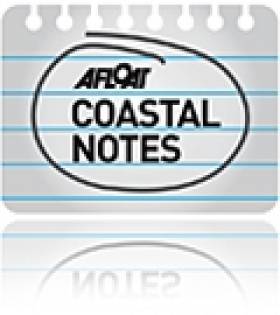Displaying items by tag: environment
Irish Marine Innovations Applauded By Euro Space Agency
#MarineScience - Irish companies and researchers have distinguished themselves by developing innovative maritime services using satellite derived data in areas as diverse as marine renewables, fisheries protection, aquaculture and tourism.
That was the message from Dr Volker Liebig, director of Earth observation programmes with the European Space Agency at the opening of a conference on 'Space Innovation - Powering Blue Growth' at the National Maritime College of Ireland in Cork last week.
Minister for Research and Innovation Sean Sherlock, who opened the two-day event, said: “There are over 40 Irish companies currently engaged in ESA programmes, many of which are directly addressing global challenges such as climate change, sea-level rise, maritime surveillance and marine environmental monitoring.
"This is a growing industry and one which will guarantee high-quality jobs for Irish people and benefit our economy into the future.”
The conference - jointly organised by the ESA, the European Commission (DG Maritime Affairs), Enterprise Ireland, University College Cork’s Coastal and Marine Research Centre, the Irish Coast Guard and the Irish Naval Service - focussed on the contribution of space to maritime policy implementation; showed how new scientific results and innovative services assist in achieving targets set by the Integrated Maritime Policy for the European Union (IMP); and assessed how the ESA space development activities and the IMP can contribute to economic growth in Europe.
Geoffrey O’Sullivan, representing Marine Institute CEO Dr Peter Heffernan, said that the conference "ably demonstrated that Space Remote Sensing had a very positive contribution to make towards developing our blue economy.”
Examples given included fisheries management (including illegal, unreported and unregulated fishing); environmental assessment; detection of oil spills and harmful algal blooms; site survey for offshore renewable energy and aquaculture platforms; search and rescue; and maritime domain awareness (MDA).
O'Sullivan added that the Conference "validated the SMARTOCEAN (ICT and the Sea) Strategy being promoted by the Marine Institute, in identifying clear opportunities for Irish researchers and SMEs to harness their significant ICT and marine research skills and drawing on 'Big Data' provided by satellite sensors to develop of range of new products, services and applications relevant to local and global markets.”
Closing the conference, Marine Minister Simon Coveney commented that “increasing maritime situational and domain awareness is paramount in promoting a more inclusive approach to maritime development in delivering both the EU Blue Growth Strategy (2012) and Ireland’s Integrated Marine Plan (Harnessing Our Ocean Wealth) launched in 2012.
"Space based systems,” he said, “are a key component of an integrated and sophisticated maritime surveillance network.”
Brussels Wants Answers From State Over Seismic Surveys
#SeismicSurvey - The Irish Times reports that the European Commission has demanded an explanation from the State regarding the absence of environmental impact assessments for seismic surveys off the west coast.
The action comes following a complaint lodged in Brussels by the Irish Whale and Dolphin Group (IWDG) in the wake of the recommencing of seismic surveys over the Corrib gas field last month.
As Irish waters are a designated whale and dolphin sanctuary, the IWDG's position is that the State must comply with the EU directive to conduct an environmental impact assessment when licensing such ocean-bound surveys.
The group says it received word from the EC that the issue has been raised with the Department of Energy, and reiterated the need for "strict protection" of cetaceans in Irish and all EU waters.
Last December the IWDG expressed concerns over the potential impact of a 2D seismic survey on harbour porpoises in the Kish Bank Basin in Dublin Bay.
As previously reported on Afloat.ie, Providence Resources subsequently suspended its licence to explore for oil and gas at what was termed the Dalkey Island Prospect.
The Irish Times has more on the story HERE.
'Fast-Track' On Cards For Revived Galway Port Development Plans
#GalwayPort - Revived plans for the €200 million redevelopment of Galway Port may take a great leap forward in the next few weeks with the publication of a new policy document by the Minister for Transport.
The Galway City Tribune reports that Minister Leo Varadkar will release a 'Port Policy Statement' containing key recommendations for a development planning application to be made under IROPI (Imperative Reasons of Overriding Public Interest) legislation.
As previously reported on Afloat.ie, plans for a new deeper port in Galway Harbour were revived in August 2012 as harbour bosses sought to exercise a clause in the EU habitats directive.
Galway Harbour Company chief executive Eamon Bradshaw said at the time that the company was taking a new route after examining previous planning applications involving sensitive habitats.
He pointed out that under article 6.4 of the EU habitats directive, applications for projects classified under IROPI legislation allow developers to compensate for any infringement on sensitive habitats by restoring an area of a similar size in a different location.
It's now expected that the IROPI 'fast-track' will be approved if the Galway Harbour Company can prove that the port will have a significant economic benefit to bot the region and Ireland as a whole.
The Galway City Tribune has much more on the story HERE.
Opportunity For a Director With The Marine Institute
#Jobs - The Marine Institute is seeking applicants for the position of Director of Marine Environment & Food Safety Services.
The director will lead an experienced team responsible for the delivery of a number of critical functions in support of seafood safety, fish health and the protection of the marine environment.
The successful candidate will work closely with Government departments, external parties and key stakeholders in the effective management of scientific services and provision of policy advice.
The director will also provide strategic direction in the targeting and management of competitive research projects funded nationally and internationally.
Candidates will have successfully managed programmes, people and resources at a senior and strategic level. You will be able to demonstrate relevant experience and qualifications as detailed in the job specification to include a primary degree complemented by at least seven years post-qualification work experience.
A detailed job description can be found at the Marine Institute website HERE. The closing date for receipt of applications is 5.30pm on Tuesday 5 February 2013.
The Marine Institute is an equal opportunities employer.
Campaigners In Dispute with BIM Over Galway Bay Fish Farm Report
#GALWAY FISH FARM - Environmental campaigners have retracted their accusation that Bord Iascaigh Mhara (BIM) suppressed a report critical of the proposed deep-sea fish farm in Galway Bay.
The Galway Independent reports on a statement released by lobby group Friends of the Irish Environment, which claimed that BIM tried to hide the study by not posting it on its website along with other materials made available for the public consultation period.
The report in question was commissioned by Inland Fisheries Ireland and is critical of the Environmental Impact Statements carried out on the proposed location for the 15,000-tonne organic salmon farm off the Aran Islands.
As previously reported on Afloat.ie, the salmon farm would be located on a 500-hectare site off Inis Oírr, and would be one of the largest of its kind in Europe, projected to be worth €103 million annually for the economy. The scheme has faced opposition from local anglers who fear it could have a negative impact on wild salmon numbers.
BIM strongly denied any wrongdoing, and the lobby group subsequently retracted its allegations upon learning that the IFI report had missed the deadline for submissions for the consultation.
“BIM certainly did not suppress or ignore or gloss over anything from IFI, because we never received anything," said a BIM spokesperson.
However, Friends of the Irish Environment now alleges that the IFI report was late due to a delay in their receipt of the Environmental Impact Statement from BIM.
The Galway Independent has more on the story HERE.
NI Waters Under Threat by Pollution and Overfishing
#COASTAL NOTES - The Belfast Telegraph this week is running a special series investigating the environmental destruction of Northern Ireland's coastal and inland waters.
As the Telegraph's Linda Stewart writes: "Northern Ireland’s once rich seas are in danger of turning into dead zones devoid of marine life."
The 'Save Our Seas' series aims to "uncover the shocking evidence of how our treasured marine and aquatic environments have been decimated by years of neglect and failure to curb over-exploitation."
Already it's been reported that Stormont faces a whopping €9.6 million fine from the EU over its failure to protect horse mussel reefs in Strangford Lough.
But according to the Telegraph, that is just one of a number of "disturbing" happenings beneath the waves, with diver Barbara Irvine reporting shocking amounts of human waste littering the sea bed.
Meanwhile, anglers are quitting the shoreline as once plentiful supplies of fish have simply vanished.
“I no longer shore fish as there is no point, there’s nothing there," says Gary Gregg of the Irish Federation of Sea Anglers.
“We’ve been blessed with a very good mixed fishery due to the confluence of the oceans coming together with cold and warm water, but we've taken too much.”
The series continues in the Belfast Telegraph all this week.
Father-Son Duo in Charity Paddle from Dublin to Donegal
#KAYAKING - A father-and-son duo from north Co Dublin will shortly embark on an epic kayak paddle from Dublin to Donegal, the Fingal Independent reports.
Dermot Higgins and his son Fionn, from Rush, will attempt to kayak from Dublin Port to the Atlantic Ocean at Ballyshannon - a distance of some 330km - by way of the Royal Canal, the River Shannon and Lough Erne.
The Higgins' - who believe they are the first to attempt such a feat - will be completely self-sufficuent for the duration of the challenge, which is hoped to raised funds for the Rush Open Organisation for Transition Status (ROOTS), a charity that intends to help communities reduce their carbon footprint and face up to environmental challenges by encouraging sustainability.
The Fingal Independent has more on the story HERE.
Northern Ireland Marine Bill Discussed at Special Workshop
#MARINE WILDLIFE - A meeting of the Northern Ireland Marine Task Force (NIMTF) last week brought together interests from across the spectrum to discuss the new Marine Bill and ensure it will "deliver for all sea users".
The workshop at Castle Espie on Strangford Lough last Thursday 22 March saw politicians sit down with environmentalists, fishermen and wind farm developers, and engage with those responsible for drafting the proposed legislation.
According to a statement from the Ulster Wildlife Trust, which is a member of the NIMTF, the bill "provides for the creation of a network of marine protected areas to protect marine wildlife" as well as a roadmap for a more joined-up approach to the North's marine resources.
NIMTF spokesperson Ricky Devlin said: "We now need to ensure that [the bill] addresses the full range of environmental, recreational and commercial interests such as fishing, diving, electricity generation and aquaculture."
A full report of the meeting will be available shortly from www.nimtf.org
Meeting for Bantry Bay Fish Farm Opponents Tonight
#COASTAL NOTES - Bantry Bay has reached its capacity for salmon farming, says the committee formed to oppose a proposed new facility at Shot Head.
Save Bantry Bay has called a public meeting for supporters tonight (24 March) at Eccles Hotel in Glengarrif, Co Cork, starting at 8.15pm - where chairman Kieran O'Shea will give a presentation on the group's "wide-ranging objections", as The Fish Site reports.
Minister for the Marine Simon Coveney is currently considering the licence application for Marine Harvet's proposed salmon farm at Shot Head in Adrigole.
Concerns among the committee's members include the potential spoiling of the area's natural beauty having a knock-on effect on tourism, and the environmental consequences of algae blooms from nitrogen and phosphorous waste.
Local fisherman fear that a fish farm of more than 100 acres would see the closing off of part of an "important ground for shrimp and prawn".
Possible infection of wild salmon in local river systems by sea lice from farmed salmon is also an issue, with the Environmental Impact Statement for Shot Head highlighting an outbreak of lice at Marine Harvest's facility in Roancarrig two years ago.
The Fish Site has more on the story HERE.
- Coastal Notes
- Fishing
- Bantry Bay
- Co Cork
- fish farm
- salmon farm
- Shot Head
- Adrigole
- Glengarrif
- Eccles Hotel
- Save Bantry Bay
- Minister for the Marine
- Simon Coveney
- Marine Harvest
- tourism
- environment
- algae blooms
- nitrogen
- phosphorous
- waste
- shrimp
- prawn
- infection
- Wild Salmon
- sea lice
- environmental impact statement
- Roancarrigh
Oil Strike Success Off Cork Coast Could Be Worth Billions
#COASTAL NOTES - Providence Resources has struck big off the south coast of Cork with an oil flow that could be worth billions of euro to the beleaguered Irish economy.
According to the Guardian, the Dublin-based company announced yesterday that oil had started to flow successfully from its Barryroe structure in the north Celtic Sea at nearly twice the rate previously projected.
Providence Resources CEO Tony O'Reilly Jr said the discovery was a "seminal day for Ireland, especially in the runup to St Patrick's Day."
Last month the firm had confirmed the presence of light oil with its first appraisal well at the site, a situation described by its technical director as "extremely encouraging".
Now that a steady flow has been achieved, future extraction from the oil field - comparable to a medium-to-large North Sea field - can surely proceed, which now puts pressure on the Government to grand permission for further exploration around the Irish coast.
As previously reported on Afloat.ie, plans by Providence Rescources to prospect for oil on the east coast off Dalkey Island have been met with fierce opposition by mainland residents and environmental groups.
The Guardian has much more on the story HERE.


























